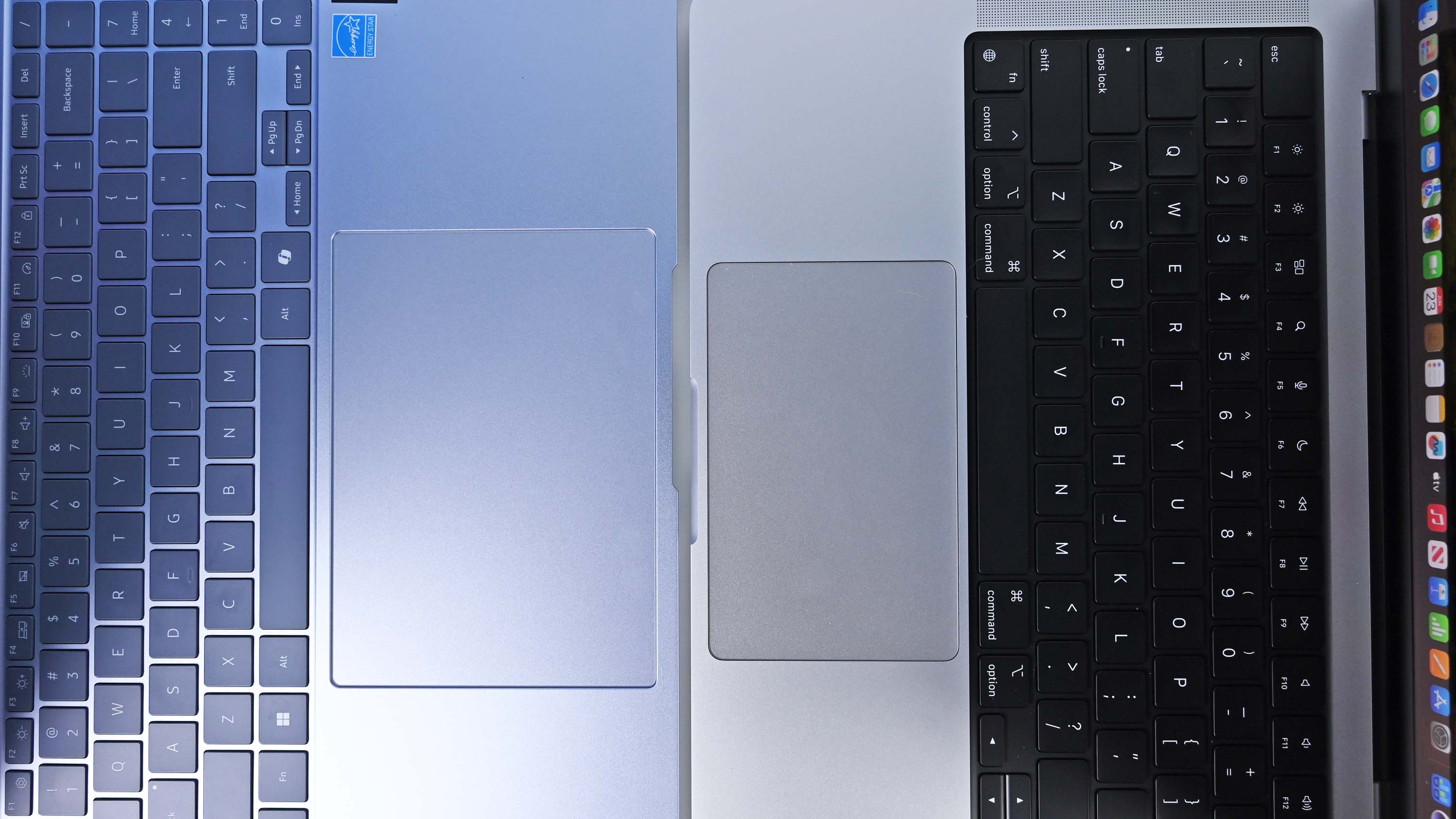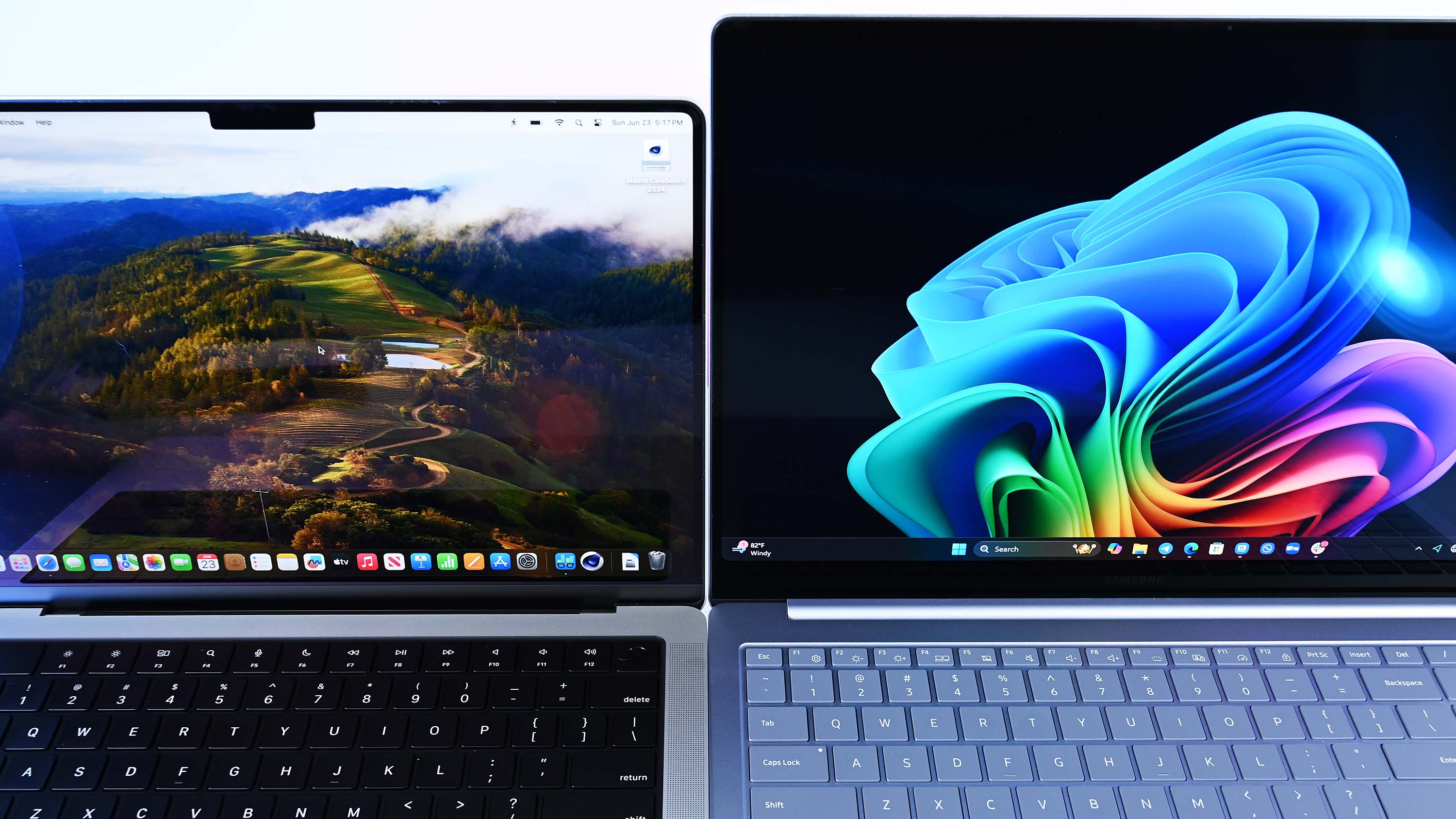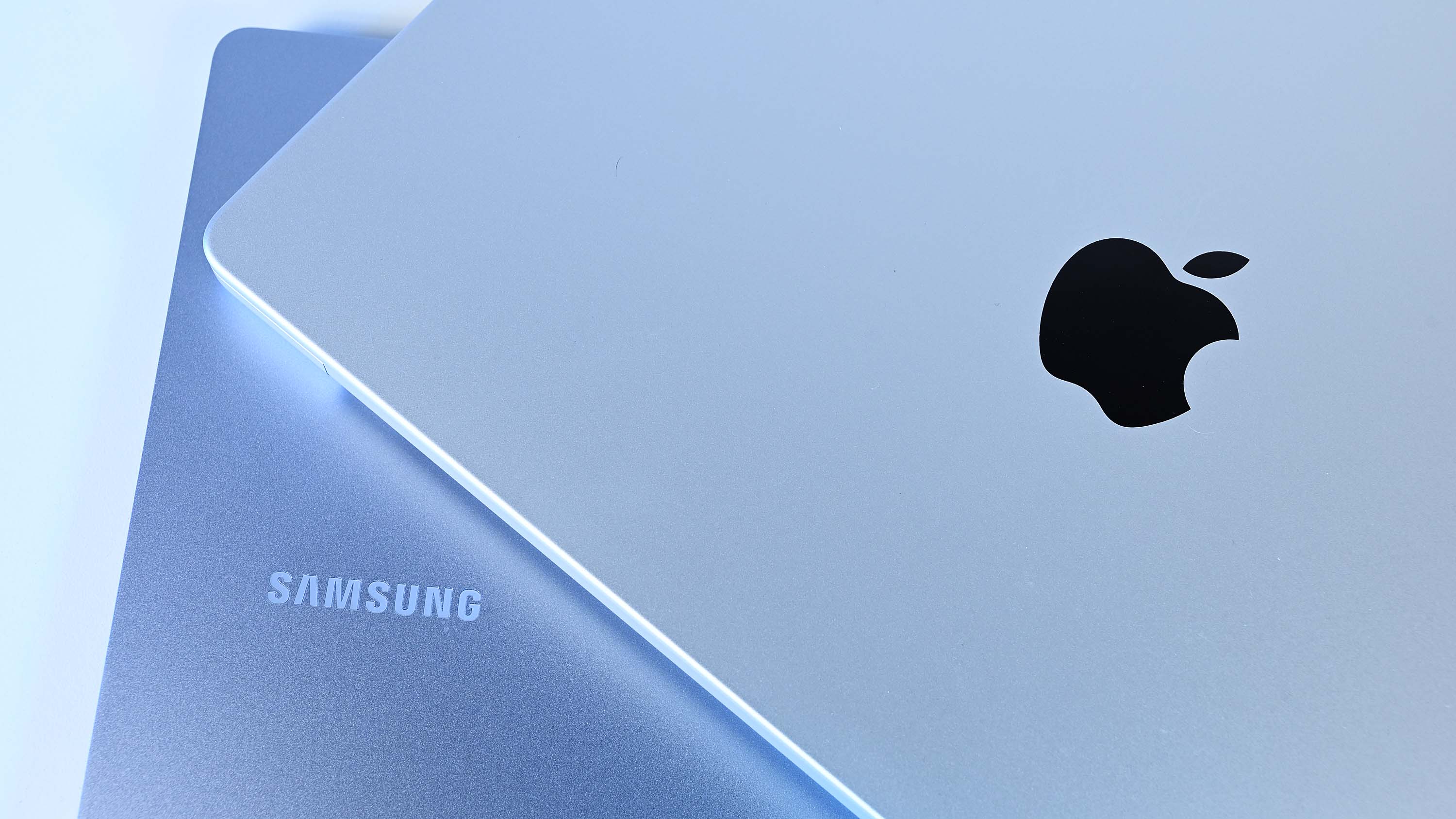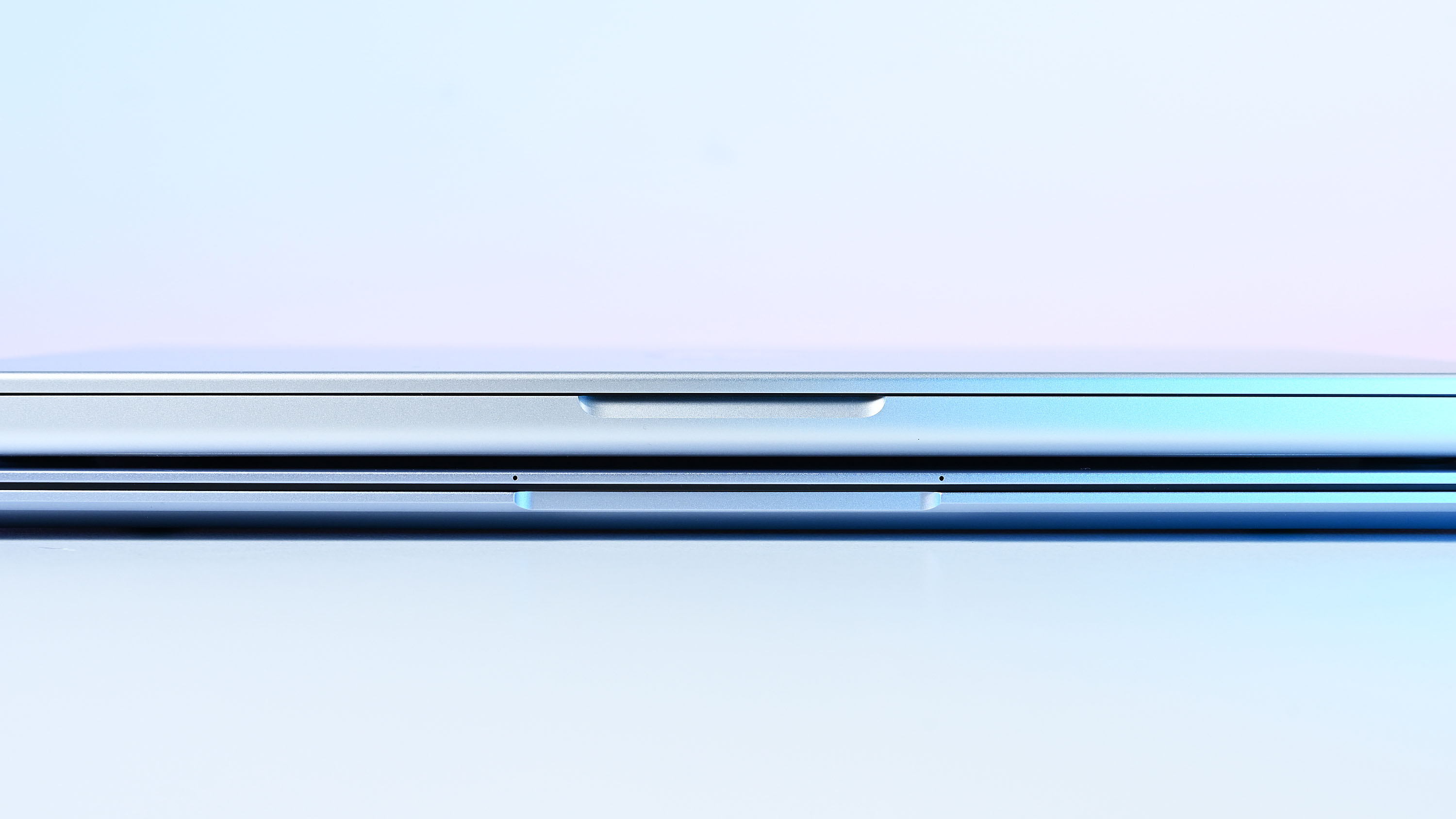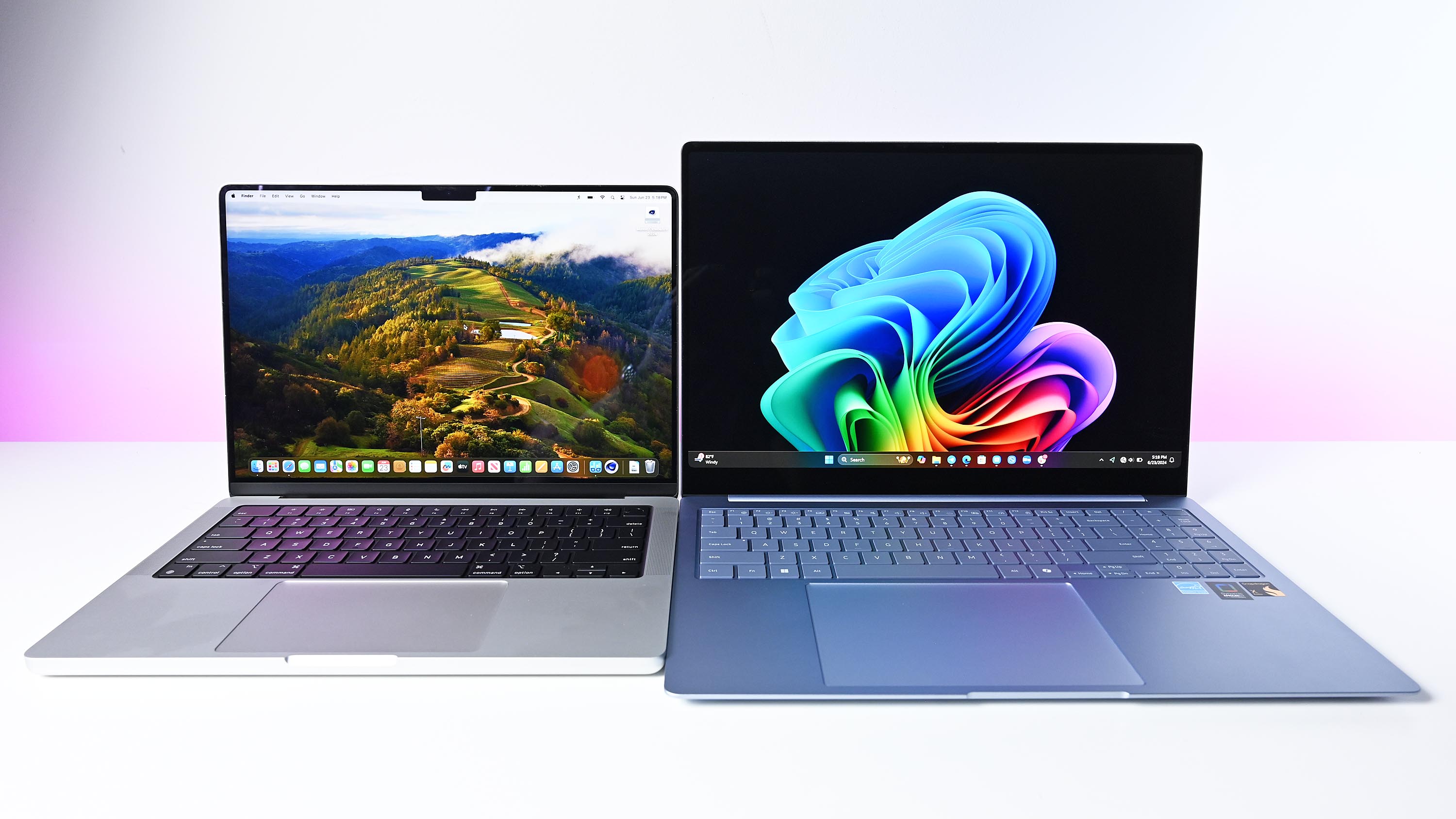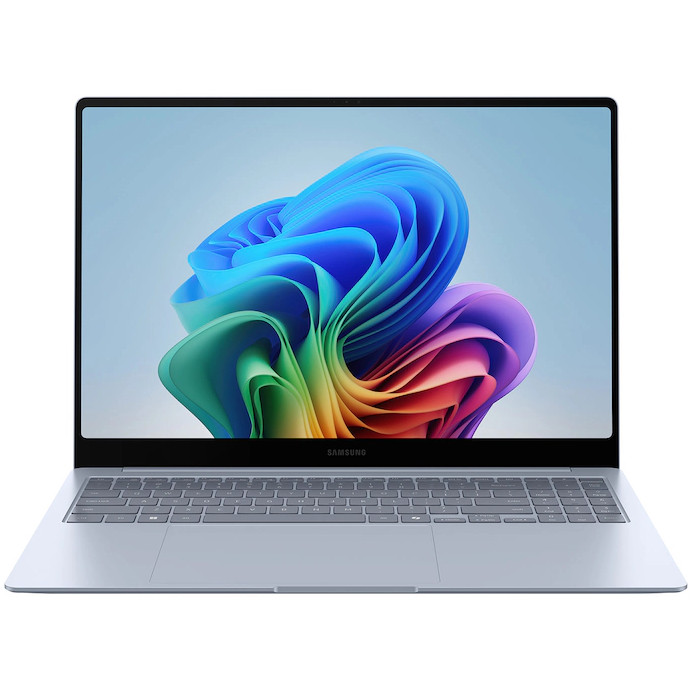
Samsung's Galaxy Book4 Edge, even with its larger 16-inch screen, is thinner and as light as the 14-inch MacBook Pro. Its X Elite performance, AMOLED display, and comfy keyboard with number pad will undoubtedly appeal to many users, especially since it's more affordable. It's also the right choice if you don't want to wait for advanced AI features baked right into the device.
Pros
- High-res AMOLED display is excellent
- Four speakers with Dolby Atmos
- Wider selection of ports
- 16-inch model is thinner and as light as the MBP 14
- Galaxy AI, Copilot+, and strong X Elite performance
Cons
- No option for more than 16GB of RAM
- Smaller battery capacity

Apple's MacBook Pro 14 is an excellent option for anyone who doesn't mind spending more. You can get extra impressive performance if you opt for M3 Pro or M3 Max chips, and the mini-LED display is gorgeous. If you'd rather run macOS instead of Windows on ARM, it's undoubtedly a tempting option that's more portable than its 16-inch sibling.
Pros
- Gorgeous Mini-LED screen comes standard
- Six speakers with Dolby Atmos
- Outstanding keyboard and touchpad
- Strong performance and efficiency
Cons
- Apple Intelligence is not here yet
- Not as many ports
- Costs more
The Samsung Galaxy Book4 Edge is one of the best Copilot+ PCs if you're shopping for a MacBook alternative. It's available in 14- and 16-inch sizes, it comes with Qualcomm's two top-tier Snapdragon X Elite chips, and it has AMOLED touch displays with accurate color reproduction and high refresh rate.
The 16-inch Book4 Edge is one of the first Copilot+ PCs we have in for testing, and we also have the MacBook Pro 14 with its M3 chip standing by for comparison purposes. Which one is better for you? Let's take a look at features, design, displays, and performance.
Galaxy Book4 Edge vs. MacBook Pro 14 (M3): Specs
Here's a look at the raw specifications that make up these laptops before we dive into a more detailed breakdown of the similarities and differences. We're focusing on the 16-inch Galaxy Book4 Edge with X Elite (X1E-84) and the 14-inch MacBook Pro with M3.
| Header Cell - Column 0 | Galaxy Book4 Edge 16 | MacBook Pro 14 (M3) |
|---|---|---|
| CPU | Snapdragon X Elite (X1E-84) | Apple M3 |
| RAM | 16GB LPDDR5x | 8GB, 16GB |
| GPU | Qualcomm Adreno (integrated) | 10-core (integrated) |
| NPU | Qualcomm Hexagon (45 TOPS) | 16-core (18 TOPS) |
| Storage | 1TB M.2 eUFS SSD | 512GB, 1TB SSD |
| Camera | 1080p | Front-facing 1080p |
| Speakers | Four speakers, Dolby Atmos | Six speakers, Dolby Atmos |
| Display | 16 inches, 2880x1800, 16:10 aspect ratio, AMOLED, 120Hz VRR, 120% DCI-P3, 400 nits (500 nits HDR) | 14.2 inches, 3024x1964, mini-LED, 1,600 nits (HDR), 120Hz adaptive refresh rate, Dolby Vision |
| Ports | Two USB4, USB-A 3.2, HDMI 2.1, microSD card reader, 3.5mm audio | Two USB4, HDMI, 3.5mm audio, SD card reader, MagSafe 3 |
| Wireless | Wi-Fi 7, Bluetooth 5.3 | Wi-Fi 6E, Bluetooth 5.3 |
| Battery | 61.8Wh | 70Wh |
| Dimensions | 13.99 x 9.86 x 0.48 inches (355.3mm x 250.4mm x 12.19mm) | 12.31 x 8.71 x 0.61 inches (312.6mm x 221.2mm x 15.5mm) |
| Weight | 3.4 pounds (1.54kg) | 3.4 pounds (1.55kg) |
| Price | $1,750 (16GB/1TB) | From $1,599 (8GB/512GB) |
Galaxy Book4 Edge vs. MacBook Pro 14 (M3): Price and availability
The first wave of Copilot+ PCs, including the Galaxy Book4 Edge, is now available at official and third-party retailers. The 16-inch model we have for review, with an X Elite (X1E-84) SoC, 16GB of RAM, and 1TB SSD, costs about $1,750.
You can also get the 16-inch version with the mid-tier X Elite (X1E-80) SoC, 16GB of RAM, and 512GB SSD starting at $1,450. The cheapest price is tied to the smaller 14-inch model with X Elite (X1E-80) SoC, 16GB of RAM, and 512GB SSD; it costs about $1,350.
The MacBook Pro 14 we're comparing here has an M3 chip, 8GB of RAM, and 512GB SSD for about $1,599. The price jumps to about $1,999 for a model with 16GB of RAM and a 1TB SSD to match the Book4 Edge spec we're comparing. That positions the Samsung laptop as the better value, especially considering the larger 16-inch display. Moving up to the MacBook Pro 16 with M3 Pro CPU, 18GB of RAM, and 512GB SSD pushes the price to $2,499.
It's worth mentioning that both Samsung and Apple have some respectable trade-in programs that can save you a ton of money. Apple says it offers up to a $1,105 rebate for a MacBook Pro, while Samsung offers up to $500 off with laptops, phones, or tablets.
All the latest news, reviews, and guides for Windows and Xbox diehards.
Galaxy Book4 Edge vs. MacBook Pro 14 (M3): Design and features
The 16-inch Galaxy Book4 Edge that we're focusing on here is impressively thin and light, especially when compared directly to the MacBook Pro 14. Both laptops weigh in at about 3.4 pounds (1.54kg) despite the Book4 Edge's larger footprint to accommodate the larger display. Samsung's laptop is also more than 3mm thinner than the Apple device.
Despite the size difference, Samsung managed to include more ports. The Book4 Edge 16 has two USB4, USB-A 3.2, HDMI 2.1, a microSD card reader, and a 3.5mm audio jack. The MacBook Pro 14 drops the USB-A port and swaps the microSD reader for a full-size SD card reader; it also has Apple's proprietary MagSafe 3 charging connection.
One important difference when it comes to ports is external display support. We're still testing how many screens the Galaxy Book4 Edge can handle, but we do know that the MacBook Pro with M3 can run up to two external displays if you close the lid on the laptop. The Book4 Edge can run a 4K display at 60Hz via the HDMI port, but we're checking to see what USB4 can handle at the same time.
As for wireless connectivity, the Book4 Edge offers Wi-Fi 7 and Bluetooth 5.3. The MacBook Pro (M3) has Wi-Fi 6E and the same Bluetooth standard. Will most users notice a difference? Probably not, especially since Wi-Fi 7 routers aren't yet too common. However, Wi-Fi 7 can offer blistering throughput and will set you up nicely for the future.
Samsung and Apple include Dolby Atmos for their audio setups, but the MacBook Pro 14 comes out on top in terms of hardware. It has six speakers in total, and the sound experience is always impressive. Samsung isn't too far behind with its quad-speaker setup, and you should expect a pleasant listening experience from both laptops when you aren't using a headset.
Typing will ultimately come down to personal preference, but the Galaxy Book4 Edge should be considered one of the best laptops with a number pad for those who need the extra keys. Samsung and Apple each offer comfortable typing, and the touchpads are oversized for easy pointing. Apple does, however, bring haptics, while the Book4 Edge still has a more traditional touchpad with moving parts.
Finally, the cameras in each laptop have a 1080p resolution and lack any facial recognition hardware. They both have a fingerprint reader instead for biometric security.
Galaxy Book4 Edge vs. MacBook Pro 14 (M3): Display
The displays in these two laptops are some of the best on the market. Focusing on the larger Galaxy Book4 Edge, it has a 16-inch AMOLED panel with a 2880x1800 resolution. The variable refresh rate reaches up to 120Hz, Samsung says it hits perfect DCI-P3 color, and it can reach up to 500 nits with HDR enabled. It otherwise tops out at 400 nits.
The Galaxy Book4 Edge adds touch functionality and an anti-reflective layer to reduce glare. It should be a great option for designers and creators.
Apple's 14-inch mini-LED display is, however, the more impressive entry. It has a higher 3024x1964 resolution for higher pixel density, it has an adaptive refresh rate up to 120Hz, and it can reach up to 1,600 nits brightness with HDR enabled. It otherwise hits 600 nits with SDR or 1,000 nits with XDR. The mini-LED tech allows for individual dimming zones, resulting in deeper blacks.
Samsung does not list Dolby Vision support, something that is available with the MacBook Pro 14. Both displays are impressive, and it will ultimately come down to how much brightness you need and whether you prefer AMOLED or mini-LED.
Galaxy Book4 Edge vs. MacBook Pro 14 (M3): Performance and battery
The 16-inch Galaxy Book4 Edge is available with the Snapdragon X Elite X1E-80 or X1E-84 SoC; our review unit has the latter high-end chip with 12 cores, a 3.8GHz multithread frequency, 4.2GHz dual-core boost, and integrated Adreno GPU with 4.6 TFLOPs. As with all Snapdragon X chips, its Hexagon Neural Processing Unit (NPU) hits 45 TOPS of power for local AI acceleration.
On Apple's side, the MacBook Pro 14 we tested has the standard M3 chip with eight cores (split in half for performance and efficiency). The performance cores reach up to 4.06GHz, and its efficiency cores hit 2.75GHz. The chip has an integrated GPU with 10 cores. It, too, has an NPU capable of about 18 TOPS.
We're still working on concrete benchmark results for power and battery life, and we'll keep this comparison updated as we get more information. We know that the MacBook Pro 14 has a 70Wh battery; the Galaxy Book4 Edge sits at 61.8Wh.
So far, we have Geekbench 6 results, which show the X1E-84 coming out well ahead of the M3 in multi-core score. It's worth mentioning that the mid-tier X1E-80 chip in the Surface Pro 11 scored 14,186 in Geekbench 6 multi-core and 2,796 in single-core.
| Header Cell - Column 0 | Samsung Galaxy Book4 Edge 16 (X1E-84) | MacBook Pro 14 (M3) |
|---|---|---|
| Geekbench 6 (single / multi) | 2,907 / 15,460 | 3,155 / 12,106 |
Gaming performance is also something we're keeping an eye on. The massive list of games compatible with Windows on ARM — which you can peruse at the WorksonWoA website — shows that Windows is still the place to game. The Galaxy Book4 Edge isn't expected to be at the same level as the best gaming laptops, but it should handle lighter titles without much effort. That's especially true with the Auto Super Resolution feature that comes as part of Copilot+, which is essentially Microsoft's own version of NVIDIA DLSS or AMD FSR that's built right into Windows 11.
Galaxy Book4 Edge vs. MacBook Pro 14 (M3): Copilot+, Galaxy AI, Apple Intelligence
Samsung and Apple each have their own proprietary AI suites available across devices. Galaxy AI works with Galaxy laptops, phones, and tablets just like Apple Intelligence works with iOS, iPadOS, and macOS. One big difference is that Galaxy AI is already available, whereas Apple Intelligence is expected in the fall of 2024.
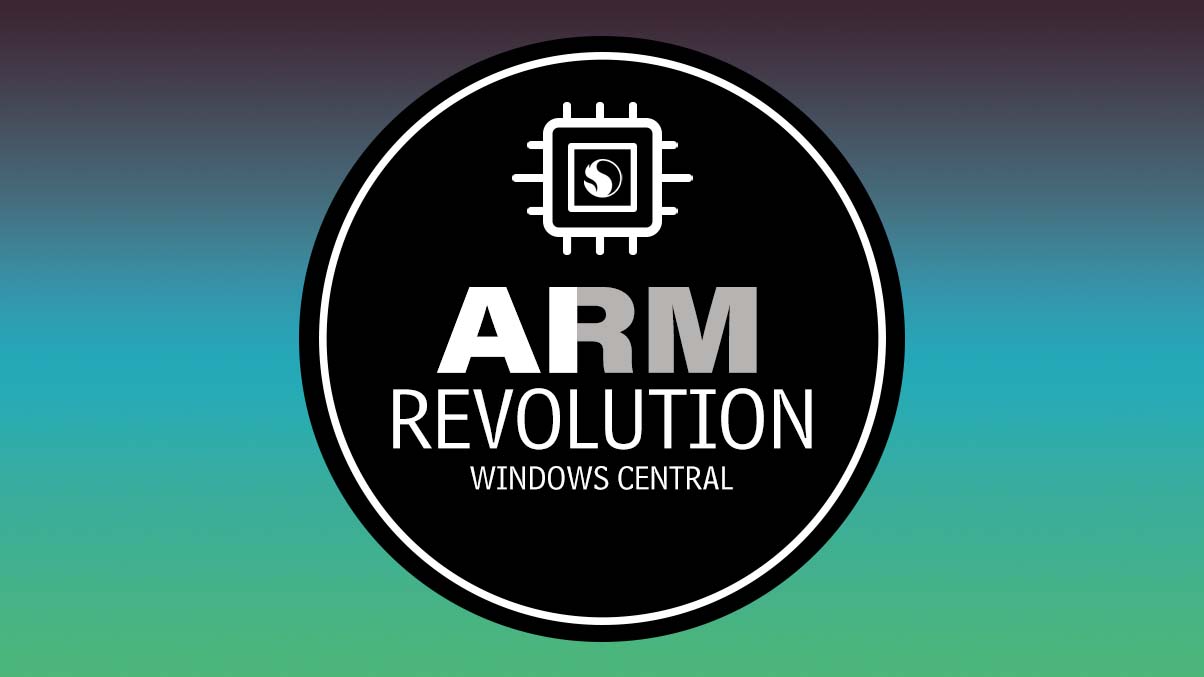
• Best Windows on ARM laptops
• Best Copilot+ PCs
• Windows on ARM FAQ
• Windows 11 apps run on ARM
• I'm obsessed with Windows on ARM
Galaxy AI allows you to connect your Galaxy phone to your Book4 Edge, blending the AI features across devices. You can take advantage of tools like Chat Assist, Live Translate, and Circle to Search seamlessly, as well as use Copilot voice commands to control your phone from your laptop.
Combined with Copilot+ tools, the Book4 Edge should be a powerful AI centerpiece for those invested in the Galaxy ecosystem. Windows Recall has been delayed due to privacy concerns, but there are nevertheless a bunch of great tools available in Copilot+. It allows you to:
- Translate video and audio in real time with Live Caption.
- Enhance your video and audio further with advanced Windows Studio Effects.
- Explore advanced AI edits in compatible design and editing software.
- Explore suggested visual and contextual edits in displayed content.
- Leverage Cocreator for advanced local image and text creation.
- Upscale games automatically with Auto Super Resolution.
Apple Intelligence is sort of a blend of Copilot+ and Galaxy AI due to it all being made by the same company. It offers recording, writing, and transcription tools, smart media search, an image creator, and more. It relies on a mix of local hardware and a cloud that Apple says runs on Apple silicon. Siri is also getting access to ChatGPT.
AI features are only expected to improve and expand, and choosing one device or the other will likely come down to where you've already invested money. If you have a Galaxy phone and earbuds already, it only makes sense to stick with Samsung. On the other hand, those with an iPhone and iPad should get a lot more out of a MacBook Pro.
Galaxy Book4 Edge vs. MacBook Pro 14 (M3): Which should you buy?
Qualcomm's Snapdragon X Systems-on-Chip (SoC) is now available in some of the best Windows laptops on the market, including the Samsung Galaxy Book4 Edge. They compete well with Apple's own M3 silicon, which is great news for Windows users who have always wanted the power and efficiency that for years was exclusive to Apple laptops.
We're still working on performance and battery testing for an accurate comparison, but from what we've seen in other Copilot+ PCs, you can expect the Book4 Edge to offer better multi-core scores. Apple does have the M3 Pro and M3 Max chips for anyone who needs the best performance possible, but keep in mind at that point the pricing climbs quickly.
The 16-inch Book4 Edge with top-tier X Elite chip, 16GB of RAM, and 1TB SSD costs about $1,750, whereas you'll pay about $1,999 for a similar setup in a smaller 14-inch MacBook Pro. Samsung's laptop can save you money while at the same time landing you a larger display.
While both laptops can be considered AI devices thanks to the inclusion of an NPU, Apple's suite of tools known as Apple Intelligence isn't set to arrive until later this year. On the other hand, Samsung's own Galaxy AI suite of tools is already working within its ecosystem, and Copilot+ is a go other than the delayed Windows Recall.

Samsung's 16-inch Galaxy Book4 Edge brings Copilot+, Galaxy AI, and Snapdragon X Elite performance and efficiency in a package that's thinner and as light as the 14-inch MacBook Pro. It's the right choice for Windows users, especially if a number pad and AMOLED display are top priorities.

The MacBook Pro 14 with M3 chip is a more expensive alternative for anyone who prefers macOS. Its next-gen AI capabilities are expected to arrive later this year, but in the meantime it remains a powerful and efficient machine with a knockout mini-LED display, comfortable keyboard, and stellar audio.

Cale Hunt brings to Windows Central more than nine years of experience writing about laptops, PCs, accessories, games, and beyond. If it runs Windows or in some way complements the hardware, there’s a good chance he knows about it, has written about it, or is already busy testing it.

